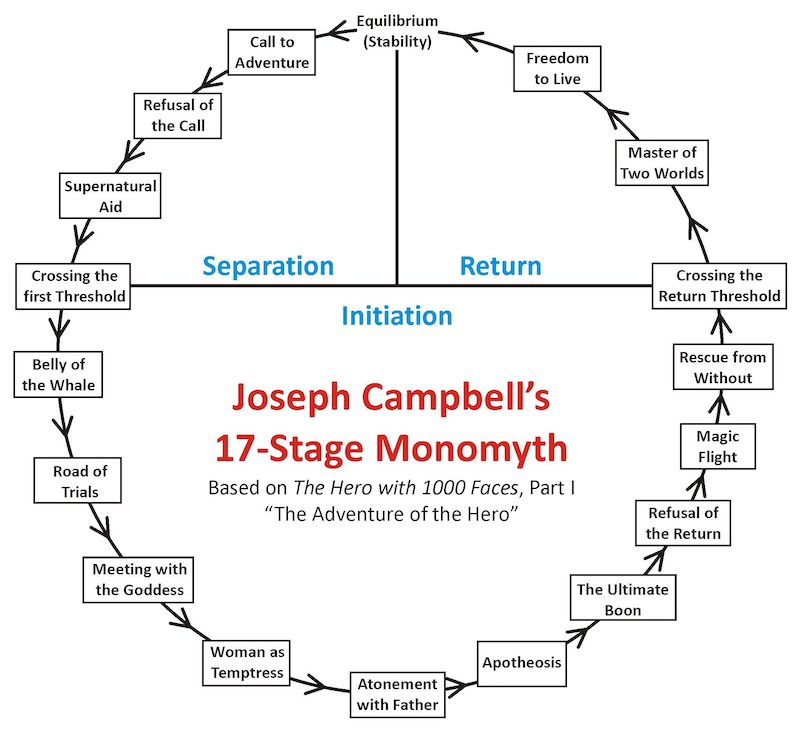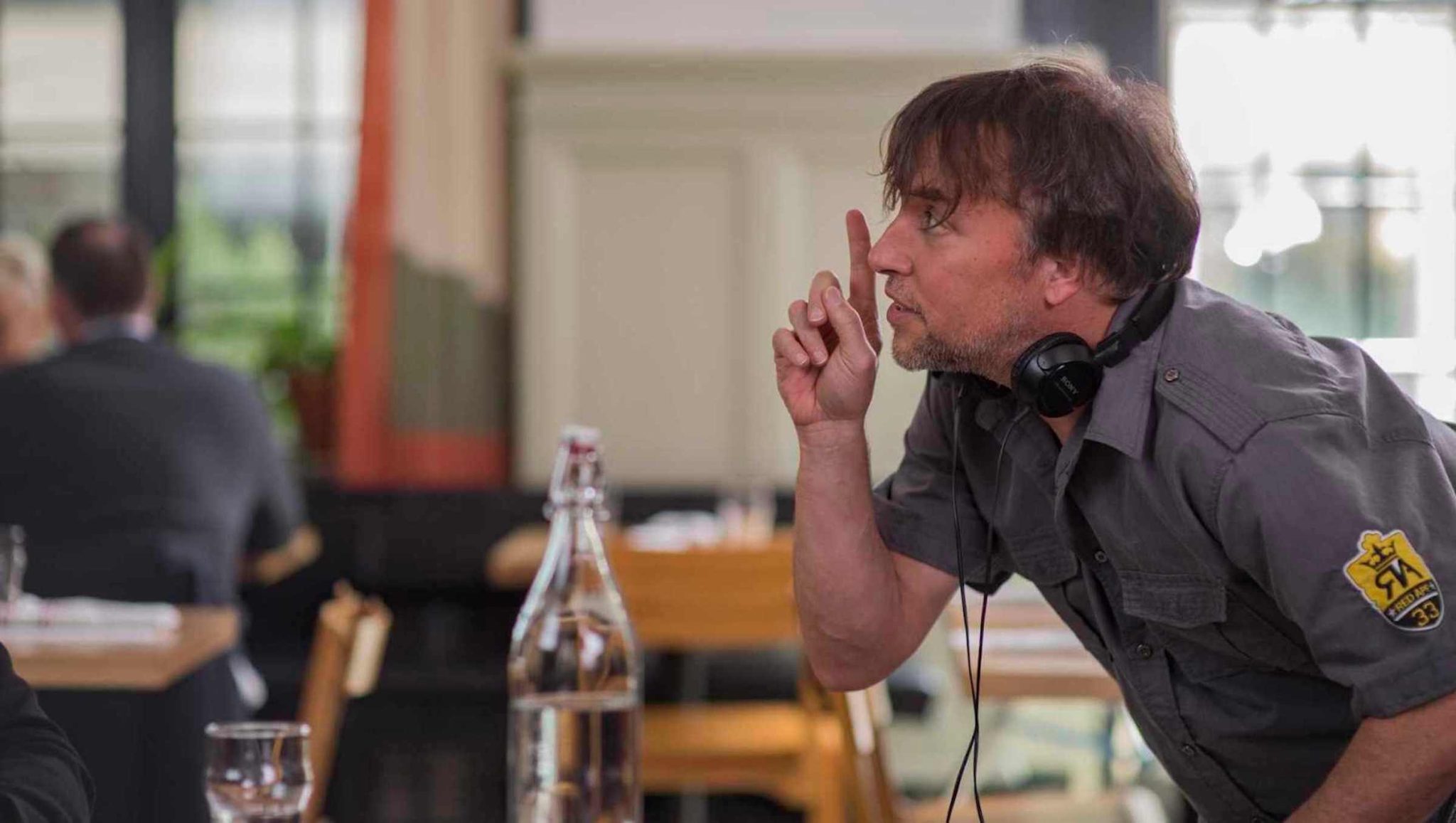
How do the twelve stages of Joseph Campbell's The Hero's Journey — as interpreted by Christopher Vogler and his book The Writer's Journey: Mythic Structure for Writers — apply to your journey as a screenwriter?
Before we dive in, grab your copy of our free e-book: 
Joseph Campbell's 17-stage Monomyth was conceptualized over the course of Campbell's own text, The Hero with a Thousand Faces, and then later in the 1980s through two documentaries, one of which introduced the term The Hero's Journey.
The first documentary, 1987's The Hero's Journey: The World of Joseph Campbell, was released with an accompanying book entitled The Hero's Journey: Joseph Campbell on His Life and Work.
The second documentary was released in 1988 and consisted of Bill Moyers' series of interviews with Campbell, accompanied by the companion book The Power of Myth.

Christopher Vogler was a Hollywood development executive and screenwriter working for Disney when he took his passion for Joseph Campbell's story monolith and developed it into a seven-page company memo for the company's development department and incoming screenwriters.
The memo, entitled A Practical Guide to The Hero with a Thousand Faces, was later developed by Vogler into The Writer's Journey: Mythic Structure for Storytellers and Screenwriters in 1992. He then elaborated on those concepts for the book The Writer's Journey: Mythic Structure For Writers.
Christopher Vogler's approach to Campbell's structure broke the mythical story structure into twelve stages. We define the stages in our own simplified interpretations:
- The Ordinary World: We see the hero's normal life at the start of the story before the adventure begins.
- Call to Adventure: The hero is faced with an event, conflict, problem, or challenge that makes them begin their adventure.
- Refusal of the Call: The hero initially refuses the adventure because of hesitation, fears, insecurity, or any other number of issues.
- Meeting the Mentor: The hero encounters a mentor that can give them advice, wisdom, information, or items that ready them for the journey ahead.
- Crossing the Threshold: The hero leaves their ordinary world for the first time and crosses the threshold into adventure.
- Tests, Allies, and Enemies: The hero learns the rules of the new world and endures tests, meets friends, and comes face-to-face with enemies.
- The Approach: The initial plan to take on the central conflict begins, but setbacks occur that cause the hero to try a new approach or adopt new ideas.
- The Ordeal: Things go wrong and added conflict is introduced. The hero experiences more difficult hurdles and obstacles, some of which may lead to a life crisis.
- The Reward: After surviving The Ordeal, the hero seizes the sword — a reward that they've earned that allows them to take on the biggest conflict. It may be a physical item or piece of knowledge or wisdom that will help them persevere.
- The Road Back: The hero sees the light at the end of the tunnel, but they are about to face even more tests and challenges.
- The Resurrection: The climax. The hero faces a final test, using everything they have learned to take on the conflict once and for all.
- The Return: The hero brings their knowledge or the "elixir" back to the ordinary world.
It's very easy for screenwriters to get lost within the process of learning how to write screenplays, writing them, and trying to market them to Hollywood to attain those coveted deals and see those ultimate dreams of becoming a professional screenwriter come true.
Much like Campbell's The Hero's Journey breakdown and its application to many different types of heroes and protagonists, your journey as a screenwriter — as well as the journeys of your peers and those that came before you — has similar themes, steps, trials, tribulations, and triumphs in common.
Here we take these twelve story arc and character arc stages and apply them to you, the screenwriter — and screenwriters as a whole around the world. Hopefully this will help you gauge where you are in your journey, and where you can look forward to going as you continue on.
1. The Screenwriter's Ordinary World
Screenwriters come from all ends of the Earth and many diverse backgrounds. There's no single time or place in life when someone decides to embark on the screenwriting journey.
So your Ordinary World is where you first realized that you want to become a screenwriter. You can also interpret it as the moment before you began writing that first screenplay — or before you started any screenplay within your screenwriting career.

If it's at the beginning of your career, you've never written a screenplay and you have yet to take the necessary steps to learn how to write one. Otherwise, it's before you've started the process of developing and writing your next screenplay.
2. Your Call to Adventure
For most screenwriters, the Call to Adventure comes when you begin to visualize and conceptualize a story that you want to tell in cinematic fashion.

You likely have a passion for film and television. You're entranced by the movies and shows that you love, and because you have the necessary active imagination and drive to tell stories embedded deep within you, those early conceptual seeds have been planted within your creative mind. The Call to Adventure is that visual, concept, or "What if...?" question that is haunting you. You can't shake it. You're thinking about it within every free moment that you have. And for many, it's even whispering in your ear when you're at work or busy with family duties.
This is the screenwriter's Call to Adventure!
3. Refusal of the Call
The Call to Adventure can be intimidating. If you're just starting out and haven't written a screenplay before, you know that there's going to be a lot that you need to learn. Hesitation, fear, and insecurity will creep into your mind, and you may question whether or not you're ready to walk down the screenwriting path.
If you've written screenplays already, choosing your next project can be just as intimidating. Those hesitations, fears, and insecurities never leave you as a screenwriter. You may think the project is too much of a risk. You may think there's too much research to be done and you aren't up to the task. You may think it's been done before — and better. You try your hardest to reject the idea and come up with reasons not to embark on the journey.

Regardless, there's always a moment where you will refuse the call of a concept that is lingering in your head. And interestingly enough, it's the ones that stick with you — the ones you can't shake — that are usually the right ones to choose.
4. Meet Your Screenwriting Mentor
Mentors are aplenty in your screenwriting journey. They come in the form of teachers, instructors, idols, screenwriting book authors, lecturers, pundits, gurus, and industry insiders.
You may take a class, read a book, watch an inspiring or informative online video, follow the Twitter feed of an established pro, or meet an industry insider at a writing conference or film festival panel. You'll likely experience all of these things, multiple times. And sometimes you'll meet that particular contact that takes you under their wing and teaches you the ins-and-outs of screenwriting.
5. Crossing the Threshold
This is the moment where you've committed to writing that first screenplay. And if it's your second, third, fourth, or fifth (and beyond), this is the moment where you begin your early development process of the script.
For beginners, you've likely decided to take this one on, but you know that you've got a long journey ahead. You can't possibly write a screenplay without learning the process. Your many mentors will help guide you down that path, but you have to make the decision to take on this adventure. It may be buying a screenwriting book, taking a class, or buying some screenwriting software. But the true crossing of the threshold occurs when you've made that commitment.
6. Tests, Allies, and Enemies
You're Alice, and you've thrown yourself down that rabbit hole.
For beginners, you're reading the books, watching the videos, reading produced screenplays, and doing whatever you can to learn the screenwriting process. However, because you've thrown yourself into this world, you'll quickly discover that there are a lot of different perspectives, beliefs, and viewpoints on how to write a screenplay. You'll come across many structures and formulas. You'll see how authors may or may not declare that their way is the ultimate path to take to write a successful screenplay.
Your initial tests will be to decipher which ones you agree and don't agree with, primarily based off of your own strengths, weaknesses, likes, dislikes, and philosophies.

You're also learning about the screenwriting rules, guidelines, and expectations.
Read ScreenCraft's The Differences Between Screenwriting Rules, Guidelines, and Expectations!
As you've been sifting through the many mentors available to you, you're going to find your true allies and enemies. You'll discover the mentors that inspire you and those that are overly cynical and not helping you on your journey.
7. The Approach
The Approach is the development phase of your screenwriting process.
You've learned the ins and outs of screenwriting. You have a slight grasp on the rules, guidelines, and expectations of screenwriting — and what the differences are between them. Now it's time to approach the story that you've chosen to tell. Based on what you've learned thus far, you'll start developing your story and characters. Maybe you outline, write a treatment, use index cards, use bullet-point lists, or whatever method you've decided to use. But you're doing the front-end work of your script. You're discovering the varying options you have from a story and character perspective. You're figuring out what type of genre you'll be telling this story within.

And as you do so, you'll likely come across many challenges.
Sometimes you won't know where to take the story. Sometimes you won't know where to take a character. You'll figure out your first act, but have no clue what should be happening in the second. Or you'll know where everything and everyone in your script is going until the very end where you don't know what the climax should be.
The front-end development work is the screenwriter's Approach to the Inmost Cave, which is tackling the first draft of the screenplay. You'll come across problems that will change your approach, the story, and the characters. And you'll have to make those adjustments before you start writing that first draft.
8. The Ordeal
Writing the first draft is agonizing for most screenwriters — even seasoned ones. It's the first actual conflict, especially for a beginning screenwriter.

The process of getting from the beginning to the end of a script is intimidating. It's a harrowing venture that also leads to many new conflicts and hurdles as you try your best to tell your story. You'll hit rough patches that you're sure you can't cross. You'll find yourself facing dead-ends with no escape in sight.
You may be enthralled with the story you've told. You'll likely find yourself on Cloud Nine because you just finished a screenplay. But then things often take a turn for the worst when you share it with someone for feedback or revisit the script after taking the necessary break from it. Everything wrong with it stands out. Just when you thought you'd triumphed, you realize that you're far from your dream.
9. The Reward
Despite the hardships of writing that first draft and realizing that it's not as good as you initially thought, you revisit it — either with feedback from others or your own realizations from your post-break read — and understand where the script needs to go. The knowledge of what works and what doesn't is the ultimate reward. And you manage to take a huge step ahead in your screenwriting journey because you've gained at least some ability to look at your own work with objective eyes — which is the pinnacle of any screenwriter's journey.

Now you have what it takes to make the script work. It may be a huge plot-point you imagined, a plot hole discovered, questions answered, or a lot of little things that amount to something special.
 Learn how to Master the Art of the Re-write with this Free Download
Learn how to Master the Art of the Re-write with this Free Download
10. The Road Back
You've seen the light at the end of the tunnel. You've discovered how to fix your screenplay. You know the strengths and weaknesses of it, and you're doing the necessary work to get that second and third draft done. It's invigorating because you see the fruits of your labor.
You'll face many more obstacles and challenges during this stage. You may finish a second draft and take it to your mentor, only to discover more notes that need to be addressed, or, at the very least, feedback that you should consider. And the true light at the end of the tunnel comes in the form of completing that final draft.

But you're not there yet. You still have to get the script out there.
11. The Resurrection
The most challenging work for most screenwriters doesn't lie within the writing of the script. Instead, it's with the marketing of it.
You've finished the screenplay. The Reward that was given to you has helped you turn that necessary corner.
But now it's time to get that screenplay out there.
You do what you can to build your industry network.
Read ScreenCraft's Maps Screenwriters Can Use to Build Their Industry Network!
You try your best to make some contacts and open the doors of opportunity.
Read ScreenCraft's How to Network & Pitch at Pitch Fests, Film Festivals, and Industry Events!
You create query emails and find ways to send them to the right people.
Read ScreenCraft's Writing the Perfect Query Letter for Your Scripts!
And you can submit your scripts to contests, competitions, and fellowships to test the waters and maybe get some feedback that may help you as well.
Read ScreenCraft's 10 Mistakes to Avoid When Entering Screenwriting Contests!
Regardless of what happens (read below), you've managed to accomplish something amazing. You've completed a screenplay, and you've continued on your journey to get it into the hands of those that can produce it. Success stories can and will vary. And for many, the journey may continue on. But no matter what happens, you've done more than most people in the world will ever do in their lives — you've pursued a dream, and you've been resurrected as a screenwriter.
You've climbed a mountain top and have created something special.
12. The Return
You head back to your Ordinary World with a wealth of experience and knowledge. You have no control over who does or doesn't buy your screenplay or hires you for an assignment — beyond the efforts you make to get your script read. That's out of your control.
But your journey isn't done yet. Now it's time to start the next script.

___________________________________________________________________________
The Screenwriter's Journey is never-ending. Unlike a fictional story, there is no final image or moment etched in stone.
These twelves stages are repeated with every single screenplay that you take on. And the journey evolves as you level-up along the way. But make no mistake, these twelve stages encompass the core journey that every screenwriter goes through.
Now that you have a map to manage your expectations and goals, where are you in your screenwriting journey? Wherever you are, we wish you safe and happy travels as you continue on...
Ken Miyamoto has worked in the film industry for nearly two decades, most notably as a studio liaison for Sony Studios and then as a script reader and story analyst for Sony Pictures. He has many studio meetings under his belt as a produced screenwriter, meeting with the likes of Sony, Dreamworks, Universal, Disney, Warner Brothers, as well as many production and management companies. He has had a previous development deal with Lionsgate, as well as multiple writing assignments, including the produced miniseries Blackout, starring Anne Heche, Sean Patrick Flanery, Billy Zane, James Brolin, Haylie Duff, Brian Bloom, Eric La Salle, and Bruce Boxleitner. Follow Ken on Twitter @KenMovies
For all the latest ScreenCraft news and updates, follow us on Twitter, Facebook, and Instagram.
Tags
Get Our Screenwriting Newsletter!
Get weekly writing inspiration delivered to your inbox - including industry news, popular articles, and more!






























